8 best goal management platforms to keep your team on track in 2025
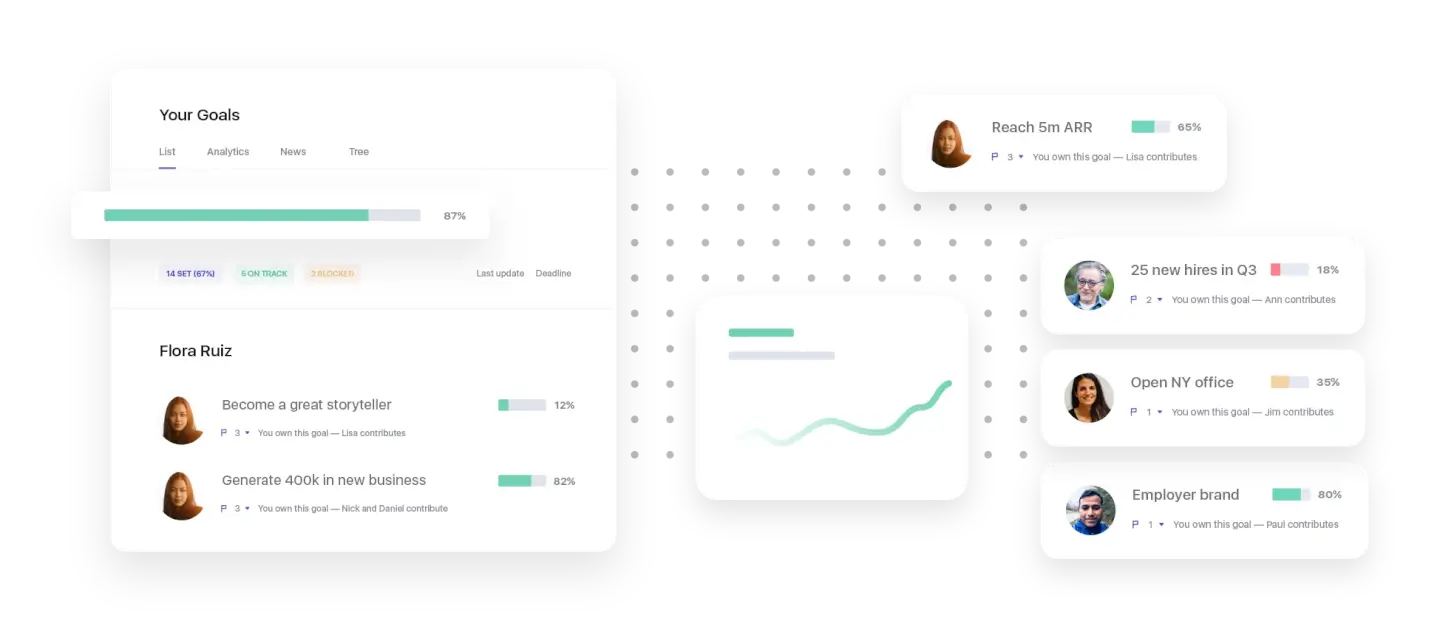
Tracking goal attainment is one of the top ways HR teams measure creativity, innovation, and task completion today.* But the most successful People leaders don’t just set up and track goals; they ensure all projects, employees, and initiatives work towards shared business objectives.
Goal management platforms automate and simplify the process of establishing, monitoring, and aligning objectives. With AI-powered frameworks and built-in people management tools, these solutions gather business performance data to support decision-making and improve outcomes.
To help you choose the right option for your company, we’ve reviewed and compared eight of the best goal management platforms on the market, so let’s begin.
🎯 Align. Track. Achieve.
Collaborate on company, team, and individual goals with our AI-powered goal-setting software!
👉 Book a demo
*Leapsome’s HR Insights Report, 2025
The information below is based on our research in May and June 2025. All user feedback referenced in the text has been sourced from independent software review platforms such as G2 and Capterra in May and June 2025.

1. Leapsome
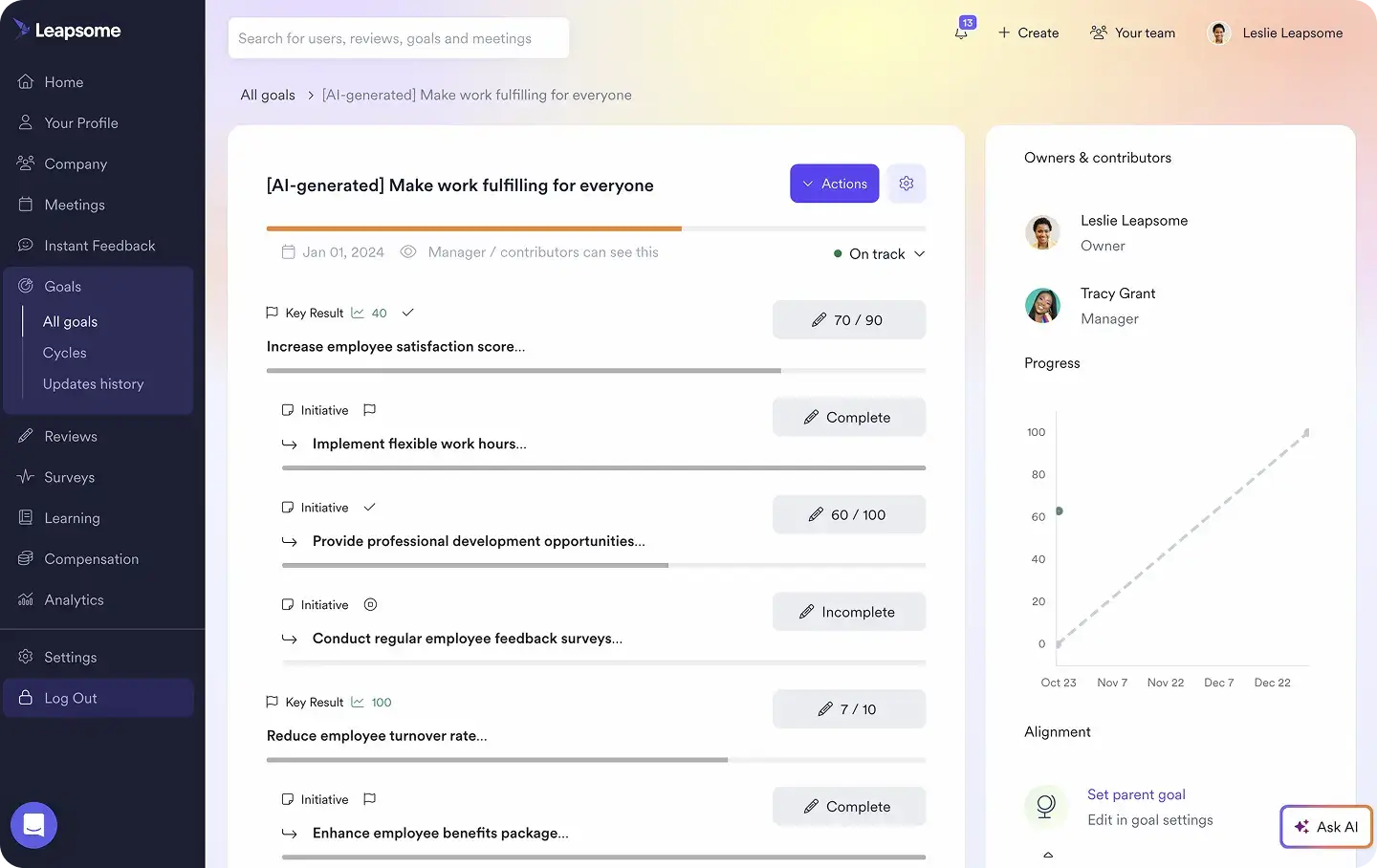
Leapsome Goals allows users to align, track, and collaborate on company, team, and individual goals. It works harmoniously with our comprehensive suite of people enablement solutions and HR features to reveal deeper progress insights and help your people thrive.
Our intelligent Goals module also has powerful, built-in AI tools that make it simple to set up robust objective frameworks without extra admin. For instance, you can automatically generate effective recommendations for initiatives that follow objectives and key results (OKR) best practices and take all relevant context into account.
Main features
- Flexible goal-setting tool that enables you to establish both OKRs and SMART goals
- Goal Tree feature to visualize cascading goals and monitor dependencies across departments
- AI-powered goal and OKR suggestions that support idea generation in line with best practices
- Jira integration that lets you connect your objectives to Jira work items (issues) directly
- Real-time goal analytics, presented in customizable dashboards that make it easy to tweak current objectives and inform future goals
- A Meetings module that can automate regular goal check-ins
- Seamless connection with Leapsome Reviews, so you can create development and skills-based objectives
- Integrated competency frameworks to track and facilitate progress along a career roadmap
- Built-in Instant Feedback tool that enables you to exchange asynchronous notes and comments about goals
- Learning module — you can create customizable learning paths based on goals
- Built-in, comprehensive HRIS
- ISO 27001 compliance
- Multilingual interface
How to set goals with Leapsome
- Accommodates a wide variety of goal-setting approaches
- Intuitive, customizable design
- Allows setup of flexible, automated goal cycles
- Fast, straightforward platform adoption
- AI-powered analytics and insights
- Integrates with Leapsome’s suite of people enablement tools and HR features
- Enables real-time feedback and comments between collaborators
- Market-leading people analytics and science
- Supports 38 languages
- A wide range of integrations, like Jira, Slack, and Microsoft Teams
- jhjkhhkjhkjhkj
- hjkjhkjhkjhjk
- khkjhkjhkjhk
- Some newer HRIS features are still in development
- Slight learning curve due to the variety of features
- kjlkjhkljkljlk
- kjlkjljl
- khkjhkjh
-

🎯 Align. Track. Achieve.
Learn how Leapsome can automate, connect, and simplify your HR processes.
Book a demo2. Lattice
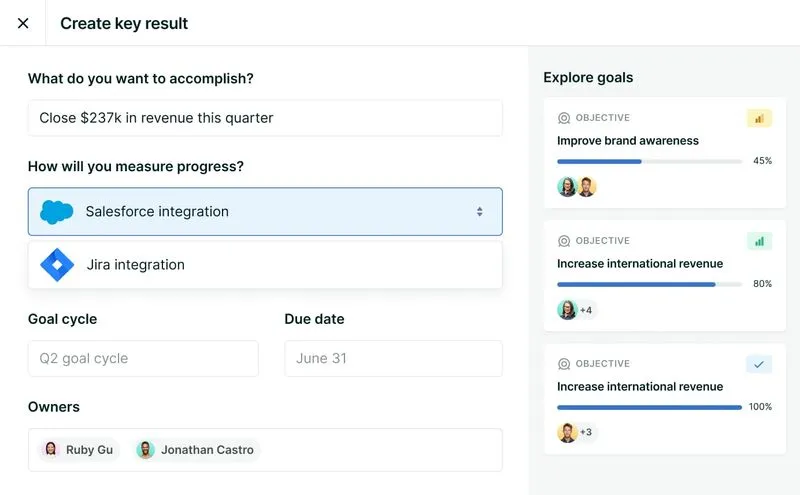
Among other people enablement and HR solutions, Lattice offers dedicated tools for managing goals. It helps connect individual objectives to department and company-wide targets, ensuring all goals align with organizational success metrics.
Lattice’s OKRs module supports further alignment between teams and objectives, presenting results in dashboards to help managers and business leaders track goal status.
While Lattice’s goal and OKR features are less advanced than some offered by alternative platforms, the platform can effectively support an employee-led approach to goal-setting and management.
Main features
- Customizable, flexible goal cycles
- Cascading and non-cascading goal frameworks
- Shared goal-setting and tracking dashboards
- Integration with employee performance and 1:1 meeting tools
- AI-powered employee engagement insights and benchmarks
- Built-in HRIS features
- Helps employees link their objectives to company initiatives
- Connects with platforms like Jira, Salesforce, and Slack
- Incorporates goals into 1:1 meeting tools
- Powerful built-in analytics and calibration features
- Easy for admins and managers to use
- list item
- Updating and completing goals can be confusing
- Some users experience challenges with customization and usability
- Some users say the Goals module can be “clunky and hard to figure out”
- list item
3. 15Five
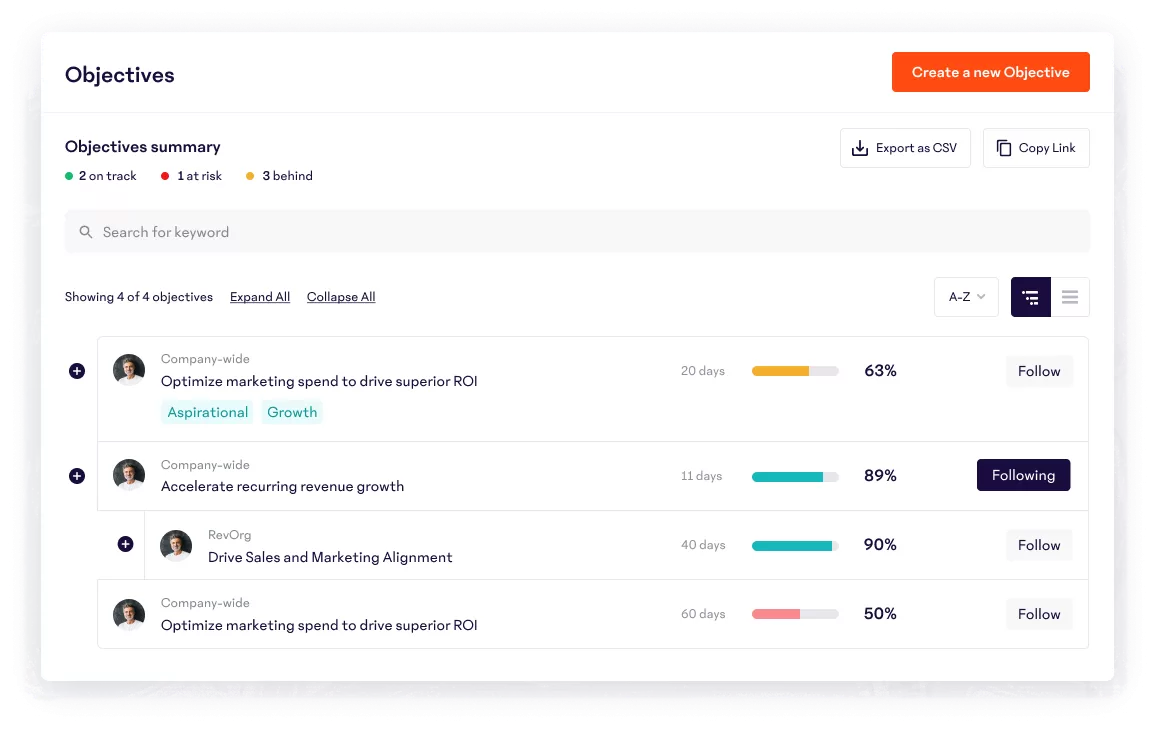
This performance management platform helps clarify and track the top objectives across the organization by showing how they’re connected to business results. Users can set individual and company OKRs, then track them in real time.
15Five’s OKR approach is based on The Center for Evidence-Based Management (CEBMa) and other critical research studies. It also integrates OKRs into feedback, weekly check-ins, and performance reviews to promote collaboration and alignment.
Main features
- OKR creation and tracking for individuals, teams, and companies
- Possible to set up hierarchical objective relationships
- Robust filtering options for easy navigation
- Objectives dashboard with reporting features
- AI-powered copilot for guidance on goal-setting best practices
- Customization options for objective tagging and visibility
- Continuous performance management and recognition tools
- Combines OKRs and goal-setting with other performance management and employee engagement capabilities
- Offers features for weekly goal progress check-ins
- Automatically updates OKRs in line with progress
- Straightforward platform setup and training
- User-friendly interface
- list item
- Lacks the ability to define milestones for project goals
- Some users have found navigating the objectives process confusing
- Some users report difficulties getting hold of customer service
- list item
4. Betterworks
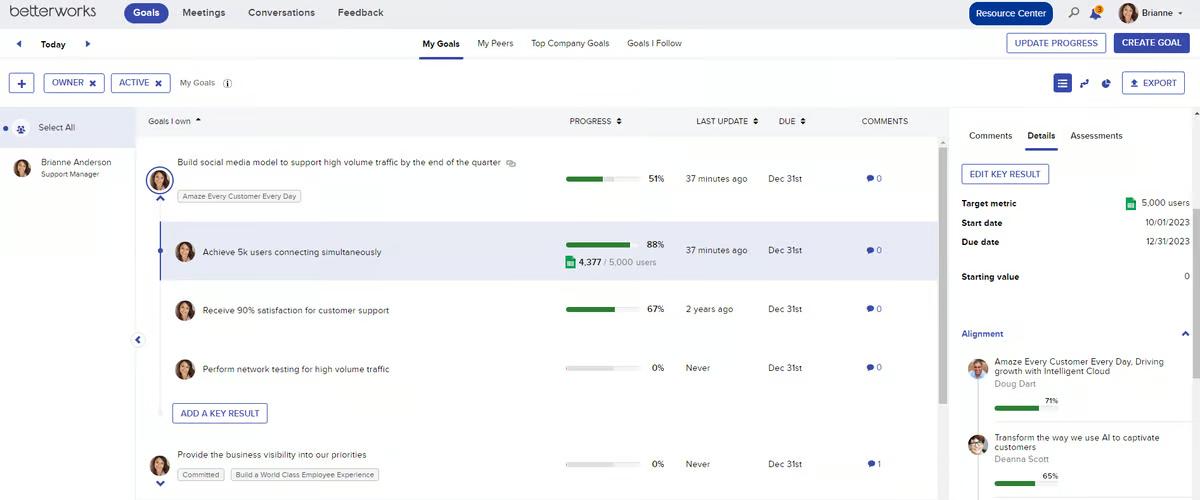
Betterworks is a performance management system for mid-market and enterprise companies. Its goal-setting, feedback, and performance review features are designed to drive engagement, prioritize growth, and align workforces with business objectives.
The platform’s solution for goals and OKRs offers flexible goal-setting to help users execute strategies with focus. Like Leapsome, Betterworks’ goal collaboration tools can be customized to suit different goal-setting methodologies.
Main features
- Customizable goal-setting automation and alignment
- Goal Quality Assistant for real-time goal tracking, scoring, and feedback
- Continuous feedback tools
- AI-powered data analytics and goal-setting insights
- Goal process visualization through performance snapshots
- Syncs with other people management software tools
- Ties together company-wide and personal goals
- Top-to-bottom alignment of organizational goals
- Intuitive and easy-to-navigate platform design
- Integration with apps like Microsoft Teams and LinkedIn Learning
- Responsive customer support
- list item
- Lacks robust customization for settings
- Some users report basic, time-consuming reporting options
- Some users say the platform is missing advanced employee engagement features
- list item
5. WorkBoard
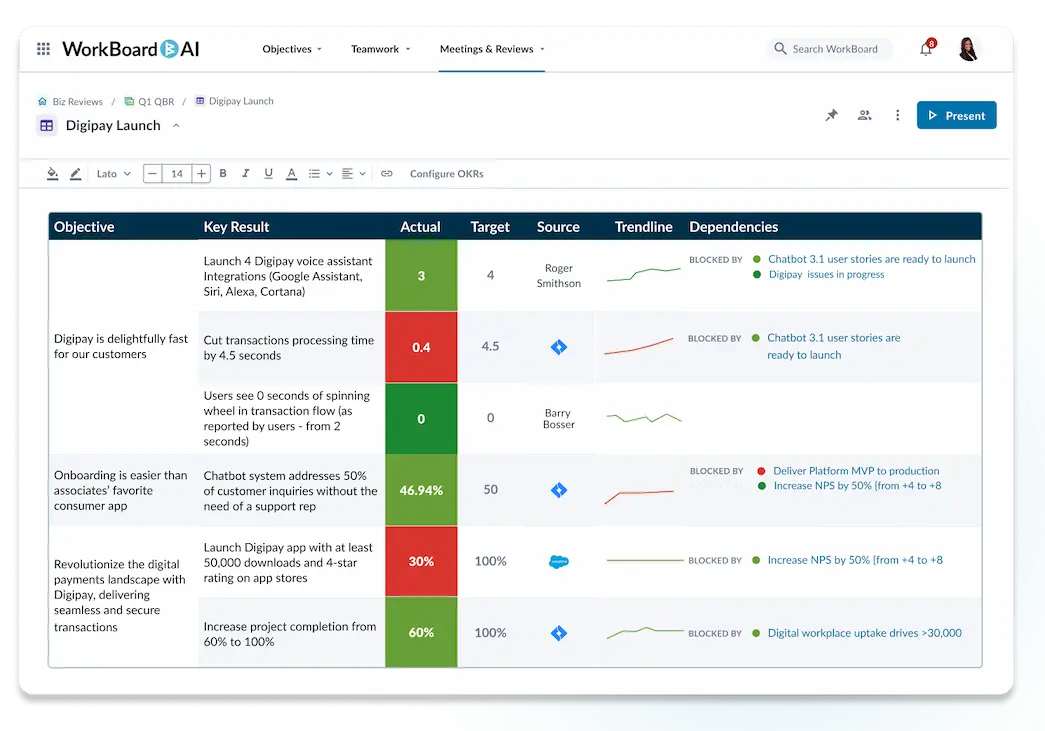
WorkBoard is an AI-driven OKR platform designed for large enterprises and later-stage startups. It facilitates comprehensive OKR management across all organizational levels, ensuring objective alignment for even the most complicated projects and processes.
Although its goal management features are fairly basic, WorkBoard can create intuitive, exportable objectives dashboards with customizable fields. Additionally, its AI tools offer smart meeting agendas that capture key takeaways relating to goals, helping streamline workflows. With a broad selection of third-party tool integrations available, this platform is a good option for companies that want to consolidate detailed OKR insights and track progress automatically.
Main features
- Possible to set multi-year strategies and link them with OKRs
- AI-generated presentations, meeting pre-reads, and notes
- Automatic summaries of dashboard changes
- Enables users to create scorecards and dashboards from across teams
- “WorkBoard Co-Author” AI tool to help create and align objectives
- Performance management dashboards for managers
- Heatmaps that show key results and goal-setting KPIs
- Tailored to suit large organizations
- Supports a cross-functional approach to strategy execution
- WorkBoard Scorecards display OKR progress on a single page
- Uses generative AI to support OKR creation and reporting
- Seamless integration with Microsoft applications
- list item
- Lacks built-in HR tools for engagement, learning, and feedback
- Some users have experienced difficulty integrating WorkBoard with internal platforms
- Currently only available in English
- list item
6. Asana
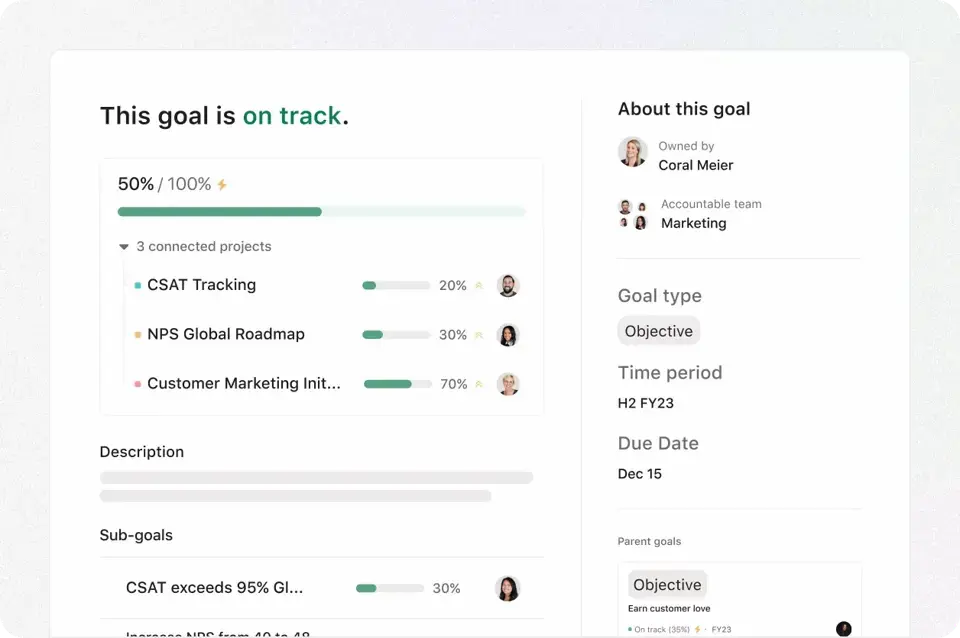
Asana is a work management platform that can help organize tasks visually. Its Goals feature “connects company objectives to the work that supports them,” allowing users to set company, team, and individual objectives. Then, it links those goals to relevant projects and portfolios and tracks them automatically.
Asana makes it simple to assign goal ownership to specific team members and create sub-goals to break down objectives into smaller pieces. With its focus on productivity, the platform best suits startups and growth-stage organizations looking to get more done with smaller teams.
Main features
- Goal-setting tool that allows users to see how smaller goals contribute to parent goals
- Reporting dashboards and analytics
- Automatic goal updates based on reporting from apps like Salesforce
- Custom views for individual teammates
- Automatic and manual goal tracking
- Portfolios where users can monitor connected projects and collaborate across teams
- Possible to link goals with milestones and projects
- Customizable and user-friendly interface
- Boosts effective team collaboration
- Strong task management tools
- Fast, responsive system
- Integrations with apps like Slack, Google Workspace, and Zapier
- list item
- Expensive subscription plans when compared with competitors
- Some users feel the configuration options are overwhelming
- Some users say the reporting and analytics features are basic
- list item
7. Personio
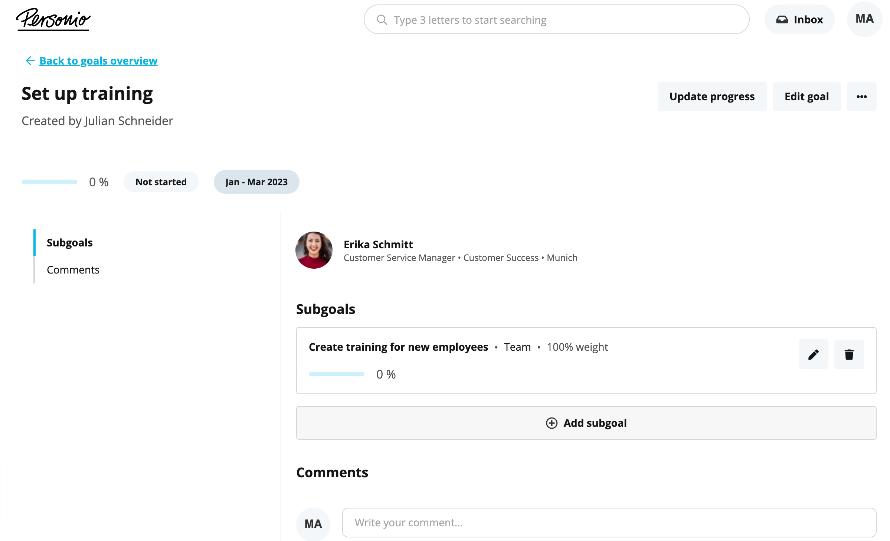
Personio’s performance management software helps managers, employees, and HR teams gain transparency on shared objectives. It consolidates goals, performance, and compensation data in one simple platform to help people leaders save time and money.
The platform’s goal and subgoal features are relatively basic. Still, they allow users to view, create, and edit goals within the Performance & Development suite, where employees, supervisors, and administrators can add comments and updates (depending on their access permissions). Personio also offers other integrated performance and development management tools to streamline everyday workflows.
Main features
- Goal- and sub-goal-setting frameworks
- Goal duplication and assignment to up to 25 employees at a time
- Categorization of responsibility (individual, team, or department)
- Custom weighting that defines the importance of each subgoal or organizational goal in reaching the employee goal
- Real-time goal status updates
- Detailed goal history and permission settings
- Continuous feedback and performance review integrations
- Company-wide, cascading goal alignment
- In-depth goal tracking with subgoals and metrics
- Offers efficient HR management and self-service tools
- User-friendly interface
- Supports integration with over 200 apps
- list item
- The Performance & Development suite is an add-on to the core platform
- Some users say customization capabilities are lacking
- Some users have complained about missing or moving features
- list item
8. monday.com
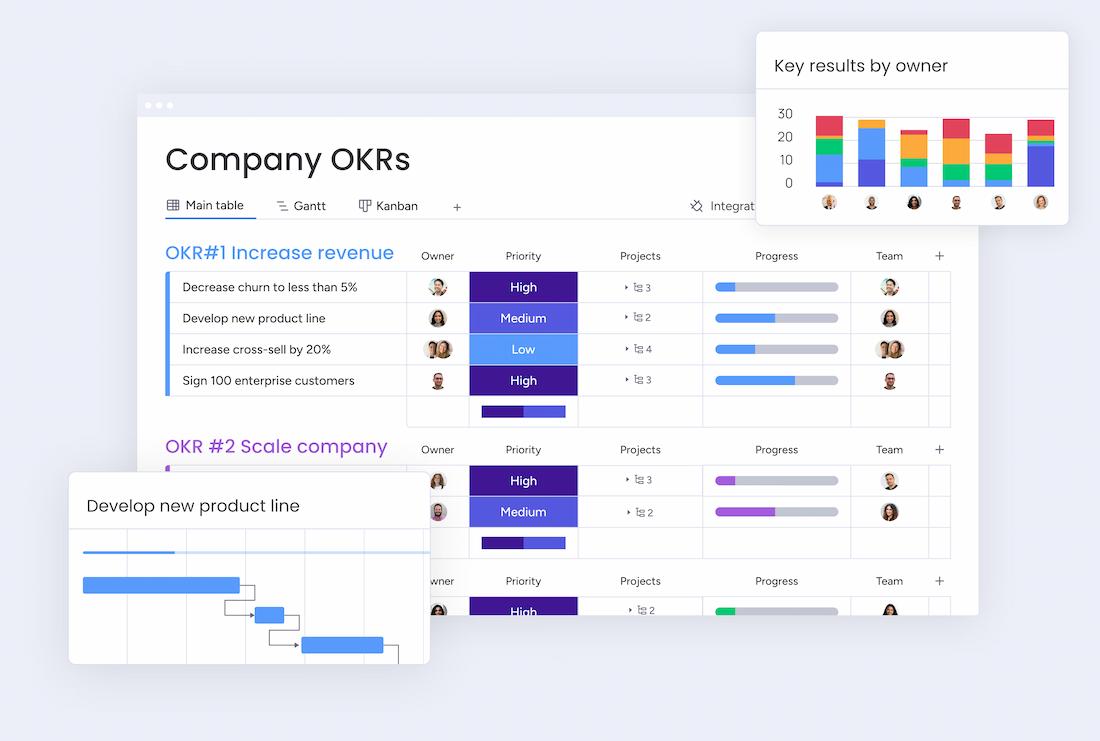
monday.com offers visibility over goal-related workstreams. However, as a project management software, it doesn’t offer the same extensive goal-setting features that some other platforms on this list do. Still, with Kanban boards, Gantt charts, performance analytics dashboards, and automations, it’s an interesting option for teams that want to manage detailed tasks and processes.
Teams can also use monday.com’s prebuilt OKR workflow board template to establish and monitor company goals. The template is fully customizable, helping connect objectives with key results and corresponding tasks. Plus, it has a formula column that can be used to calculate automatic “grades” for each completed objective.
Main features
- 200+ prebuilt and customizable project management templates
- Gantt charts displaying project statuses at a glance
- AI work management assistant
- Kanban boards that give teams more visibility over their tasks and projects
- Dashboards and reporting for project budgets and workloads
- Integration with other project management office (PMO) apps
- Flexible views that allow users to track different parts of projects
- A broad range of project management tools for workflow organization
- Clear, intuitive visual dashboards that show results
- Ready-to-use templates for OKR and project management
- Strong automations for task assignment, notifications, and item progress
- Helps streamline collaboration between multiple departments and processes
- Users can add external guests (e.g., clients or freelancers) to shared boards
- list item
- Steep learning curve as the platform requires some awareness of formula functions and features
- Doesn’t offer robust in-platform integrations with HR management tools
- Some users report occasional lags and slow response times
- list item
Why customers love us

.svg)
Leapsome has been an absolute game-changer for me in terms of my professional growth and development. What I love best about Leapsome is how it has empowered me to take control of my career journey. The user-friendly interface and intuitive design of Leapsome have made it incredibly easy for me to navigate and utilize the platform.
Victor J.
Enterprise (1000+ employees)

.svg)
Leapsome stands out as a best-in-class platform that seamlessly addresses a spectrum of organizational needs, excelling in performance management, employee engagement, OKRs, and learning. Its unparalleled strength lies in its deep integration with existing tools, effortlessly connecting with our HRIS, Slack, Calendar, and Jira.
Jamie S.
Mid-market (50-1000 employees)

.svg)
Our company is new to Leapsome, but the onboarding has been fantastic. Our Leapsome contact has worked with us every step of the way to make sure that the review process will be easy on HR and all employees. He has walked us through the process step by step to create a review that will be ready to roll out pretty much immediately.
Karen H.
Mid-market (50-1000 employees)






Frequently Asked Questions
Provides clarity on work expectations by providing a centralized location for answers;Gives employees a place to provide open and constructive feedback on the workplace;Cuts down on the amount of physical paperwork employees need to sign and keep track of.
Provides clarity on work expectations by providing a centralized location for answers;Gives employees a place to provide open and constructive feedback on the workplace;Cuts down on the amount of physical paperwork employees need to sign and keep track of.
Provides clarity on work expectations by providing a centralized location for answers;Gives employees a place to provide open and constructive feedback on the workplace;Cuts down on the amount of physical paperwork employees need to sign and keep track of.
Provides clarity on work expectations by providing a centralized location for answers;Gives employees a place to provide open and constructive feedback on the workplace;Cuts down on the amount of physical paperwork employees need to sign and keep track of.
Common Pricing questions
Our Customer Success team will help you get up and running and guide you to customize Leapsome to your organization’s needs. To learn more about the services we offer, head to our customer experience page.
Please note: Our customer success team’s services are only available to customers who implement Leapsome with an annual contract of €6,000 (or US$6,000) or more. However, ongoing email support and our Success Center of articles, videos, and best-practice resources are always available for all customers.
Yes, absolutely! You can test out Leapsome free of charge for a full 14 days — no credit card required.
Pricing depends on the number of employees, modules used, and contract length. You can use the calculator above to see an estimate of the price per employee per month by selecting the modules that you are interested in but please reach out to get a quote.
Continuous feedback is essential for employee development. To facilitate this, the Competency Framework, Instant Feedback, and Meetings modules are included in all plans, for all customers, at no extra cost.
These features are tightly integrated with the other parts of the platform. You can think of these as the glue that binds your processes together, giving your employees the tools to establish a culture of regular feedback and recognition.
The security of your data is our top priority. Learn more about our data protection policies.
Thanks to our best practice frameworks, Leapsome is ready to use from day 1. The setup is made easy with integrations with major HRIS platforms. Full implementation is usually done in 1–4 weeks.
There’s no setup fee and no additional or hidden costs!
The Leapsome platform — including all email notifications — is available in 13 languages: Chinese, Dutch, English, French, German, Italian, Japanese, Korean, Polish, Portuguese, Russian, Spanish, and Swedish. Our sales team, customer support team, and our Success Center are available in English and German.
Our Customer Success team will help you get up and running and guide you to customize Leapsome to your organization’s needs. To learn more about the services we offer, head to our customer experience page.
Please note: Our customer success team’s services are only available to customers who implement Leapsome with an annual contract of €6,000 (or US$6,000) or more. However, ongoing email support and our Success Center of articles, videos, and best-practice resources are always available for all customers.
Yes, absolutely! You can test out Leapsome free of charge for a full 14 days — no credit card required.
Pricing depends on the number of employees, modules used, and contract length. You can use the calculator above to see an estimate of the price per employee per month by selecting the modules that you are interested in but please reach out to get a quote.
Continuous feedback is essential for employee development. To facilitate this, the Competency Framework, Instant Feedback, and Meetings modules are included in all plans, for all customers, at no extra cost.
These features are tightly integrated with the other parts of the platform. You can think of these as the glue that binds your processes together, giving your employees the tools to establish a culture of regular feedback and recognition.
The security of your data is our top priority. Learn more about our data protection policies.
Thanks to our best practice frameworks, Leapsome is ready to use from day 1. The setup is made easy with integrations with major HRIS platforms. Full implementation is usually done in 1–4 weeks.
There’s no setup fee and no additional or hidden costs!
The Leapsome platform — including all email notifications — is available in 13 languages: Chinese, Dutch, English, French, German, Italian, Japanese, Korean, Polish, Portuguese, Russian, Spanish, and Swedish. Our sales team, customer support team, and our Success Center are available in English and German.
A goal-setting program is a structured process that organizations and teams follow to set and achieve objectives. An effective program should provide a clear roadmap for identifying and formulating objectives and a framework (such as the SMART goals framework) for action planning and progress monitoring.
Goal management platforms and strategic planning software are designed to provide these guidelines, helping monitor deadlines, reminders, and key metrics tied to core objectives. Additionally, platforms like Leapsome integrate goal-setting into other areas of people management, like performance reviews, feedback, and learning.
Goal-setting software helps track progression by providing a structured system for defining, tracking, and collaborating on different objectives. Most software incorporates task management tools to break larger initiatives into smaller steps and visualize goal progress in charts, graphs, and dashboards.
Some goal management platforms also deliver regular goal-setting notifications to keep all parties updated and accountable. Others sync employee goal tracking with meeting software and automatically display goal statuses on the side of every meeting agenda, keeping everyone motivated and on track, as well as ensuring accountability and transparency.
A goal management platform is software that helps individuals, teams, and businesses set, track, and report on their objectives. It breaks goals into smaller tasks or steps based on tried-and-tested frameworks and provides a central place to monitor progress and collaborate.
Modern goal management platforms like Leapsome include built-in automations and AI features that can ideate goals and OKRs, create and update dashboards, generate visuals, and come up with key insights. Goal and OKR software can also send automatic goal-setting reminders through the platform or via integrations like Slack or Microsoft Teams. Combined with employee enablement tools like Reviews, Surveys, and Learning, these platforms provide the backbone of an effective and measurable people-first HR strategy.

Take Leapsome for a spin
Learn how Leapsome can automate, connect, and simplify your HR processes.
Book your demo




.webp)



.webp)














